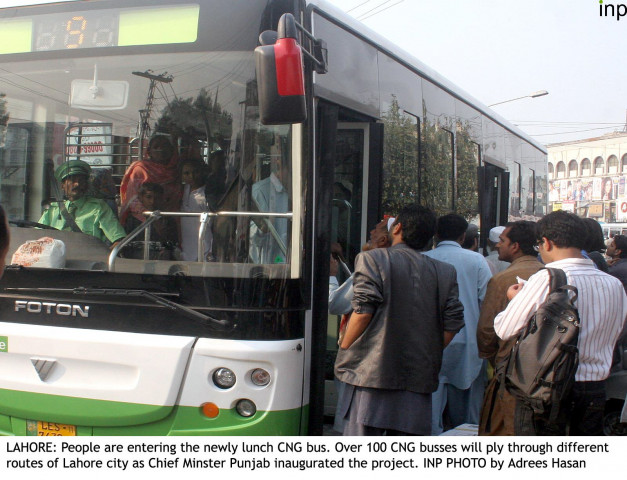Public transport, bus stops not so secure for women
The audit projects an assessment of ground safety issues faced by female and transgender commuters

PHOTO: INP
The initiative is part of gender equality and the empowerment of women under United Nations. It is being carried out in collaboration with Punjab Safe Cities Authority, and the Punjab Commission on Status of Women.
Investments in public transport fail to impress commuters
As a part of the audit, working members of Aurat Foundation stood at four main bus stops around the city at four different peak hours to observe the prevalent situation in terms of women safety and mobility and fill out an audit report consisting of checklists and self-observation.
Aurat Foundation Resident Director Mumtaz Mughal said the audit involved an assessment of ground safety issues faced by female and transgender commuters. According to Mumtaz, the safety audit will provide statistics on the types and level of threats faced by women, identify gaps and barriers of transport services to prevent and respond to harassment and put forward actionable recommendations for the local government, transport authorities, corporates and other stakeholders to end violence against women travellers.
Mumtaz said mobility was one of the biggest issues to be considered in terms of ensuring their economic empowerment.
“Even though the government did take certain initiatives regarding safe public transport, there is still a majority that travels through private buses, which are far less regulated,” she said.
“A lot of families do not allow their female relatives to work only because women face huge challenges before reaching to their work places,” Mumtaz added.
She said previous observations on women’s mobility reveal that women’s movement and their use of public transport is compromised due to the discomfort, social stigma and fear of harassment when they are compelled to sit in close contact with unrelated men.
Muhammad Tanwir, who was conducting the audit at Peco Road Kot Lakhpat bus stop, said the stop was frequented by factory workers nearby but there was no shade, sitting area, drinking water or surveillance cameras installed there at bus stop.
He recommended that proper security response mechanism should be put in place for women and transgender so that incidents of harassment could be stopped and discouraged at the spot.
According to Tanwir, the checklist included availability of drinking water, light during night time, visibility in terms of how busy or secluded area.
“We‘ve also assessed on how quickly, women and transgenders can find escape routes in any serious situation”, Tanwir said.
He said the audit also assessed, other factors like surveillance, frequency of police patrolling the area, accessibility towards the area.
Women-only 'pink taxis' set to hit Pakistani streets
Samina Javed, a Monitoring and Evaluation Officer at Aurat Foundation, who was conducting the audit at RA bazaar bus stand, noticed that there is no washroom for male and female commuters both.
“Since this bus stop is quiet wide and open, it translates into being less secure for women, similarly unavailability of proper lighting arrangement during night time is also being reported by people which is another safety threat for women,” she said.
Samina added that there were no other amenities like water or sitting area for people, despite being the most frequent bus stops.
“Personally, I noticed that due to high frequency of incoming buses, the waiting time is considerably less at the RA bazaar bus stop as compared to other stops, which means there are less chances of women being harassed,” she said.
She said women standing at bus stops were more vulnerable as compared to any other public place like market, since there was a threat of them being followed till their homes, especially school and college going girls, who have to reach their homes in any case.
“We’ve also seen that even when women protest publicly against any sort of harassment, the general attitude of public and bus conductors or divers does not go in favour of them,” she said.
Published in The Express Tribune, June 23rd, 2017.



















COMMENTS
Comments are moderated and generally will be posted if they are on-topic and not abusive.
For more information, please see our Comments FAQ